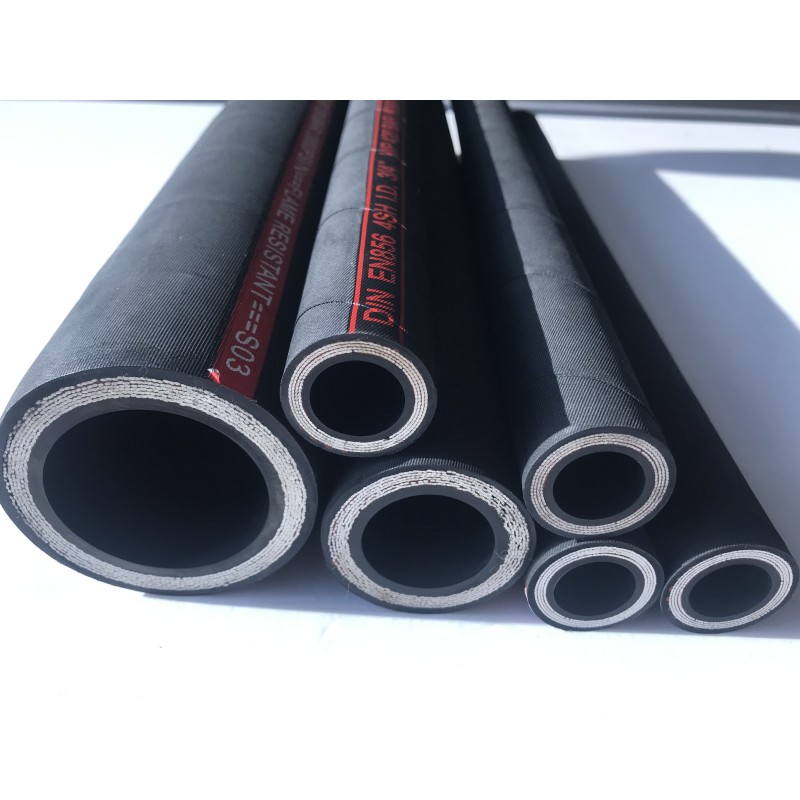Jul . 27, 2024 07:05 Back to list
Understanding the Importance of Hydraulic Hoses in Tractor Performance and Efficiency
Understanding Tractor Hydraulic Hoses Their Importance and Functionality
Tractors are indispensable machines in modern agriculture, playing a crucial role in facilitating various tasks, from tilling soil to transporting heavy loads. At the heart of many of these tractors' functions is a complex hydraulic system that relies heavily on hydraulic hoses. These hoses are integral to the efficient operation and safety of hydraulic systems, and understanding their design, function, and maintenance is essential for anyone involved in agricultural machinery.
What Are Hydraulic Hoses?
Hydraulic hoses are flexible tubes used to convey hydraulic fluid between different components in a hydraulic system. Their primary function is to transmit high-pressure fluid to power machinery, such as loaders, backhoes, and other implements attached to tractors. Typically constructed from a combination of rubber and reinforced materials, these hoses come equipped with internal fittings that connect to hydraulic pumps, cylinders, and other hydraulic components.
The Importance of Hydraulic Hoses in Tractors
The role of hydraulic hoses in tractors cannot be overstated. They serve several crucial functions
1. Power Transmission Tractors rely on hydraulic power to lift and lower implements, steer, and perform other functions. Hydraulic hoses are responsible for conveying the high-pressure fluid that drives these operations, thereby ensuring that the machinery operates smoothly and efficiently.
2. Flexibility The flexibility of hydraulic hoses allows for easy movement and connection between various tractor components. This flexibility is vital, especially in dynamic agricultural environments where equipment often encounters uneven terrain.
3. Durability Properly designed hydraulic hoses can withstand extreme pressure and temperature variations, making them suitable for the rugged demands of agricultural tasks. The hoses are typically engineered with multiple layers of reinforcement to prevent bursting or leakage.
tractor hydraulic hose

4. Safety Hydraulic fluids can be hazardous, and a failure in the hose can lead to leaks, spills, and even accidents. High-quality hydraulic hoses are designed to prevent such failures, ensuring the safety of both the operator and the environment.
Maintenance of Hydraulic Hoses
To ensure the longevity and efficiency of hydraulic hoses, regular maintenance is essential. Here are some key maintenance practices
1. Visual Inspection Regularly inspecting hoses for signs of wear, such as cracks, abrasions, or bulges, can help identify potential failures before they occur. It’s advisable to check connections and fittings as well to ensure there are no leaks.
2. Cleanliness Maintaining clean connections is crucial. Any contamination in the hydraulic fluid can lead to decreased performance or damage to the hydraulic components.
3. Proper Storage When not in use, hydraulic hoses should be stored properly to avoid kinking or sharp bends, which can compromise their integrity.
4. Replacement It’s important to replace hydraulic hoses periodically, as they can deteriorate over time even if they appear to be in good condition. Following the manufacturer's recommendations for replacement intervals can help prevent unexpected failures.
Conclusion
Hydraulic hoses are vital components of tractor hydraulic systems, providing the necessary medium for power transmission and ensuring the efficient operation of various implements. Understanding their functionality, importance, and maintenance can significantly enhance the performance and safety of agricultural machinery. By taking proactive measures in inspecting and maintaining hydraulic hoses, farmers and operators can reduce downtime, increase productivity, and ultimately achieve better results in their agricultural endeavors.
-
Best Four Steel Wire Spiral Hose Hydraulic R12 – Durable High-Pressure Hose Manufacturer
NewsJul.08,2025
-
High-Quality 1/4 Hydraulic Hose – Soft, Flexible & Durable Rubber Hoses for Industrial Use
NewsJul.08,2025
-
1 1 2 Inch Hydraulic Flexible Hose - Durable, Reliable, High-Pressure Solutions
NewsJul.07,2025
-
High-Quality 1 2 Rubber Hose - Durable, Flexible Hydraulic Solutions
NewsJul.07,2025
-
Discover SAE Hydraulic Hose Types - High Quality & Durable Hoses from Leading Factory Supplier
NewsJul.06,2025
-
High Pressure Wire Hydraulic Rubber Hose Supplier Durable & Reliable 1SN Hose Solutions
NewsJul.06,2025
